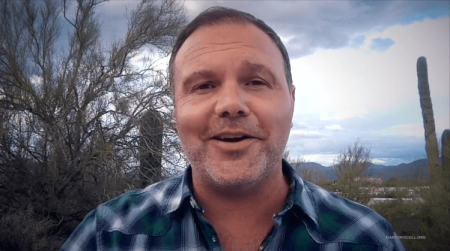Can Christians Get Tattoos According to the Bible? Pastor Mark Driscoll Answers

Tattoos are celebrated by some to be a creative outlet for self-expression and individuality, while others have quoted the Bible to oppose body ink. Arizona-based Trinity Church pastor Mark Driscoll attempts to answer this oft-debated question: Is it OK for Christians to get tattoos?
In a video newsletter posted to his website this week, Driscoll said that while he doesn't have any tattoos, and neither do his wife and teenage children, he isn't opposed to them. "I'm not against 'em, but [I] just don't have one," he explained. There was, however, one caveat.
"When it comes to tattoos, there's only one place in the Bible that seems to say you can't get a tattoo," the pastor said, and referred to Leviticus 19:26-30.
Driscoll explained the context of Leviticus 19 and how, in the days of the Old Testament, some Christians took part in the cultish, ancient pagan practice of marking and cutting their bodies in order to be affiliated with "the realm of the dead."
He said that pagans of that time were, in essence, branding themselves like cattle.
Leviticus 19:28 specifically spoke against that practice: "Ye shall not make any cuttings in your flesh for the dead, nor print any marks upon you: I am the Lord."
Driscoll clarified that that Scripture is not referring to "just any old marking of the body ... What God's people were not to do is brand themselves as if they belonged to some pagan god … God wanted His people to not be doing things that were pagan and non-Christian, and demonic in nature."
The Trinity Church pastor explained that many of the prohibitive laws under the Old Testament, such as those found in Leviticus 19, which include civil, ceremonial and moral laws, have been fulfilled by Christ and are therefore no longer in effect. "That means we're no longer under the law, we're under grace and the rule of Jesus."
So what does it all mean? Driscoll says that when it comes to Old Testament law it has to be determined if it's still binding today, considering the cultural context of the time. "I'm not saying that we don't obey the Bible, and I'm not saying that it doesn't matter. I'm saying that when it's fulfilled by Jesus, we're no longer under and obligated to it."
The pastor challenged younger viewers to determine why they want a tattoo and whether or not getting one will honor their parents' wishes. He asked those who are contemplating a tattoo to take into account the nature of the tattoo and whether it would be communicating something that was not Christian, or was vulgar.
Otherwise, Driscoll said he didn't see anything wrong with a Christian getting a tattoo.
" … If you love Jesus, and you're of age, and your conscience is clear and you want to do it as an artistic expression — or maybe even to share your faith with a verse — I would say then it's between you and the Lord Jesus and I would give it to conscience, and I don't think there's anything in Scripture that expressly forbids it."
He added, "There's also nothing in Scripture that expressly commands it. So it's not something you have to do. I don't think it's something that you're forbidden to do. I think that it's something, in relationship with the Holy Spirit and wise counsel, you can do if you want to."
Driscoll's detailed exposition on tattoos as they relate to the Bible is in keeping with his comments last month that he'll function as a teaching pastor at his newly formed Trinity Church.
Driscoll was once described as one of America's "most prominent and celebrated pastors" by Forbes, but he resigned in disgrace as senior pastor of Seattle-based Mars Hill Church in October 2014 after a confluence of events marred his reputation, including allegations of plagiarism and fostering an abusive work environment. Two weeks after Driscoll's resignation, Mars Hill announced that it would dissolve.





















